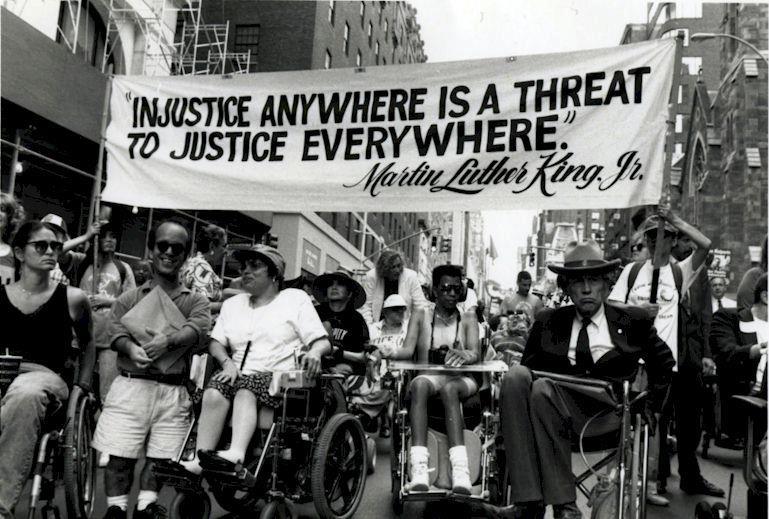The MDA’s 44th annual Labor Day Telethon was on the TV. Since my family and I were on the local (Mobile, AL) MD Telethon several times, and my mom served a year as Mobile MDA’s president, I thought I should comment.
Many activists attack the MDA for fundraising based on pity. It’s true that their 1950s attitudes about disability can be really grating; the Telethon is decidedly stuck in the past, both in how they see us and their entertainment–it’s always had the kind of acts you would expect to see on The Tonight Show with Johnny Carson; this year’s guests included Tony Orlando, the new Menudo (sans Ricky Martin) and Charo. But what sticks in my craw isn’t that as much as the misleading nature of the Telethon.

Let’s look at some of the misleading claims from this year’s Telethon (from MDA.org):
Telethon claim: MDA provides flu shots to people with MD. “For only $30, you can provide a flu shot for Jerry’s Kids!”.
The truth: Just because national MDA authorizes local branches to cover flu shots, doesn’t mean all do. From what I’ve heard, one guy gets flu shots at an MDA clinic in California, but they aren’t available from Boston MDA. And I don’t know if the reborn Mobile, AL MDA does this, but I never saw the old Mobile MDA offer flu shots (prior to them getting shut down for fraud/embezzlement in 1993).
Telethon claim: MDA provides occupational therapy, physical therapy, and respiratory therapy consultations to people with MD.
The truth: I’m sure some clinics provide this, but I’ve never actually seen it or heard about people receiving this. And remember that if you don’t live near a clinic, you can’t access this, or any MDA services for that matter.
Telethon claim: Thanks to your generous donations all kids with MD can go to MDA summer camp, with no charge to the families!.
The truth: My mom was charged $500 per child. People aren’t barred from camp due to inability to pay, but many local branches directly contradict Telethon promises and bill parents.
Telethon claim: MDA provides wheelchairs for people with MD. On the Telethon, you see shiny new wheelchairs in a row, and all these happy people who got wheelchairs.
The truth: Even for young children they provide little of what is on the Telethon. They will pay up to $2000 toward the purchase of a wheelchair (only if Medicaid and/or private insurance won’t cover all of it) and these days $2k will cover about one tire on a powerchair. And even that small assistance is exceedingly difficult to get. So, needless to say, very few of us get wheelchairs from the MDA. In this annual report on the MDA web site, they brag about giving out the $2k equipment payment (for wheelchairs, crutches, braces, etc.) to 4,200 people in 2008. Think about that. Out of all the millions of MD patients in the U.S., only 4,200 got equipment help last year. There are probably 4000 people with muscular dystrophy in Alabama and Georgia alone who need chairs! The facts on the ground make MDA CEO Bob Ross’ claim that “millions depend on the MDA for their very survival” more than a bit dubious (Ross, who gets $500,000 a year salary from the MDA, “depends” on them way more than most MD patients!)

Right now we are in a situation where the public thinks the MDA is covering much more than they actually are, and that can sometimes even complicate efforts to get public sector assistance. When I was in Montgomery arguing against Medicaid’s 21-cutoff, a state senator said, “doesn’t the MDA cover that?” He was baffled and incredulous when told no.
The MDA could change its misleading ways by a) changing their policies and widely providing the goods and services advertised on the Telethon. OR b) stop misleading the audience that they are providing goods and services to us. Just come out and say, “we mainly do research, here are some research projects we are doing.” They could interview researchers and do a lot with the truth. I think it’d be cool to learn about MDA-funded scientific breakthroughs and what they mean. Show us illustrations of how dystrophin works, a diagram of a mitochondrion! Be honest and you’ll go far.
I wouldn’t mind the Telethon as much if they practiced what they preach or preached what they actually practiced. I want the MDA to reform, but I’m not holding my breath.
Nick
Related Bloggery:
Scott Sands Alive: Begging For Charity
Danny Kodmur’s story of the UCP Telethon, and how it improved
